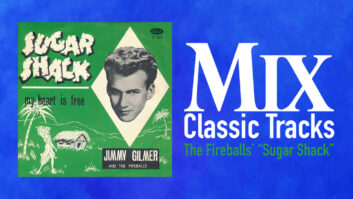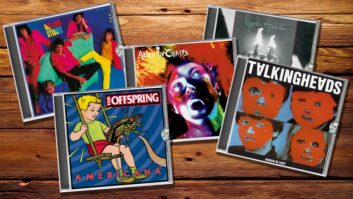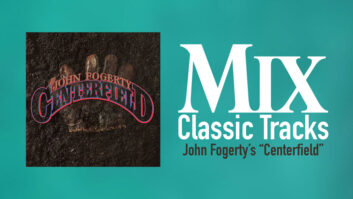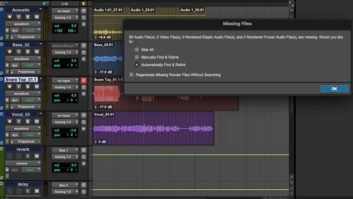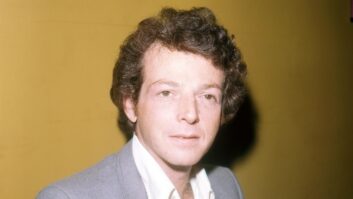When I was in high school, I loved to write incendiary satiricalarticles for the school paper about then-fashionable topics like war,racism, drugs and music. (Gee, not much has changed, has it?) One wasso outrageous that I asked the editors to use a pseudonym in thebyline.
The article, which contained not a grain of truth, caused a hugeuproar. Letters were written to the local newspapers, committees wereformed, resolutions were introduced. Administrators pontificated abouthow a lowly student could have come by such damaging knowledge.Eventually, the tempest died down, but nobody bothered to ask who theauthor actually was or whether the article was serious.
Which brings us to the music industry today. We know sales are downand people are downloading music without paying for it. But besidesthat, despite all of the hot air, falling-sky predictions and moralproclamations, no one seems to really know what’s going on.
Maybe that’s because no one has asked the people who are reallygoing to decide the future of the music business: the kids. Youngpeople in that crucial 18 to 25 demographic are forming the tastes andpreferences that will rule their buying habits for the rest of theirlives. I see lots of efforts being made by corporate America toinfluence their tastes and behaviors, but not much in the way offinding out what they really think and want. So I asked. And theanswers were pretty interesting.
I talked to seven young people, four men and three women, aged 20 to22, from all over the country. Six are in college. Some are looking topursue a career in music; others are just enthusiastic listeners. Thesekids are worth listening to. Like it or not, our future depends onthem.
The participants (not their real names):
Terri: from Texas, in her last year of college as amusic-industry major and looking to have a career in music marketing.She plays the piano “for my own amusement.”
Chris: from Los Angeles, majoring in electrical engineering,also in his last year of school. He has seriously studied songwritingand plays in a band.
Amelia: from New York, a psychology major. She plans to go tolaw school.
Rob: from Pennsylvania, majoring in biomedical engineering.He’s a singer and works with a semipro a cappella group.
Wayne: from Tennessee. He didn’t finish high school and nowworks with cars. Many of his friends are going to music school, and hisstepfather is a successful studio session player.
Anna: from Chicago, an environmental engineering major, alsovery interested in cultural anthropology and ethnomusicology.
Eric: from Massachusetts, enrolled in a collegemusic-industry program, plays bass in a band “for fun.”
Where do you get the music you listen to? Do you pay for it orget it free?
Rob: The music I listen to regularly is off of CDs, but whenI’m at my computer or when I’m traveling, I listen to MP3s downloadedfrom one of the P2P services. When I’m going on a long trip, instead ofwaiting to rip all of my CDs to MP3, it’s often just faster to downloadit and burn it directly onto an MP3 CD.
Amelia: I buy CDs, burn them from friends, download music andalso listen to the radio. I download more than anything. I pay formaybe 30 percent of what I listen to.
Anna: I don’t download anymore since Napster shut down. I buyCDs, more used than new. There is nothing I enjoy more than buying usedCDs. I would much rather spend my money on a CD than clothes, andnothing makes my day like a cheap CD.
Eric: I haven’t bought a CD in a long time. When Napster wasgetting put down, and Metallica and the others were making so muchnoise, I thought a lot of the bands were crybabies, so I stoppedlistening to mainstream stuff. I know the people in a lot of the localbands, and they just give their CDs away for promotion, to get theirsound out. I don’t really use KaZaA much anymore. I used to, every oncein a while, but I go through newsgroups now. You get the whole CD; youdon’t just pick and choose one song, which might not even be what youwant.
Wayne: I don’t buy new music — mostly. I used to workat Tower, so I try to go to Tower, but like everybody else says, it’stoo damn expensive.
Terri: I don’t buy many CDs. The last time was a few monthsago for a gift. My little sister still buys them. She’s 13; for her,they’re still cool. I listen to the radio when I know a station that’sgood, but radio gets old and bland. I just listen on my computer,getting music from KaZaA.
What would you consider to be a fair price for a CD?
Chris: Under nine dollars.
Anna: For used CDs, about $7.99 or $8.99. New ones I try notto buy for over $14.
Rob: Sub-10 dollars, unless it’s a new release and I’m reallyinto the band, then I’ll pay $16 or $17. There have been times when Iwas going to the store to get one $17 disc and I ended up not buyingit, but spending $20 on two other discs.
Wayne: You pay $20 and there would be two good songs on it.You get home and you’re pissed off that you bought it. I go to usedstores, but mostly for vinyl. It sounds better to me than CDs.
Terri: For the price of a CD, I can eat for a week. I’d paynine or $10. You can find those, but it’s usually in used CD stores, orelse they’re really old and I don’t want to listen to them.
Eric: I honestly don’t feel that going out and buying a CD isworth it now. Any other company that would still have the same productfor 20 years wouldn’t be in business without upgrading their product asubstantial amount. It’s the labels saying, “We own 80 percent ofthe market, and we can do anything we want. This is the product, youbuy it.” And it came to a point where, don’t we have a say in itanymore?
Are you happy with the sound quality of the music youdownload?
Wayne: I don’t really hear the difference between the MP3s Idownload and a CD I bought in a store. On the vinyl, the ranges arebigger: Instead of a flat sound, it’s more spread out, more of a livefeel. It does sound better.
Rob: I’ve downloaded enough now to hear the difference. Iused to think that MP3s sounded good, and I still do, but when Istarted getting MP3s and then the CDs, I’d hear all of this otherstuff. The more I listen to MP3s, the more I notice little compressionartifacts like poor stereo separation or a smearing of higher-frequencycontent, like hi-hats. So, I’ll typically go out and buy the album,turn off the PC and listen to the disc with headphones. Especially ifyou’ve got a really carefully made album with really goodengineering.
Amelia: Sometimes you get bad ones. We’ll download it and sayto each other, “Wait a minute, does that sound right toyou?” You can tell. Sometimes, there’s a difference between thebetter MP3s and the CDs, but not really. I’ll download a song, and thenI’ll listen to a friend’s CD, and it’s, “Well, same thing tome.”
Chris: I sometimes forget it’s compressed, and I’ll listen toa song, and I’ll think this band is great, but the sonic quality isn’tvery good. And then I’ll think, “Oh, right, it’s MP3.”
Eric: I don’t think there’s much of a difference. A lot ofprograms out there can convert MP3s into .WAV files, and that creates aclearer sound. It’s just a notch below the quality of a CD.
Are there advantages to having a CD vs. downloading analbum?
Amelia: The booklet. I read a lot about artists, and thebooklet has pictures and credits and thank yous. And since everyone’susing samples, with every song they tell you who they sampled from, soyou can go and listen to the original. And also lyrics: if you want toknow the words of the song. I have all of my discs together in a littlezipper container, and I arrange it so I have the covers outside and theCDs inside.
Rob: I have a couple of friends who have record collections,and it’s really satisfying for them to go over to the shelf and takeout a record and put it on the turntable and put the needle on. For me,the same thing goes for CDs. And you’re not just hearing one song bythe artists, but you’re hearing the entire picture of what the artisthas to present.
What happens when you leave school and you don’t have a freebroadband connection anymore?
Chris: I become much more frugal in what I listen to. I spenda lot more time listening to the CDs that I already have.
Terri: I can’t imagine not spending the money for a somewhatspeedy Internet [connection]. That would drive me insane. You want touse it for Internet anyway, so the music is a bonus.
Rob: If I didn’t have that connection, I would probably nothave had nearly as diverse music tastes. Over the past few years, I’veswitched back and forth between a high-speed connection and a modem,and my musical interests have expanded at a more rapid rate when I havehad access to a broadband connection. I have AOL DSL at home.
How do you hear about new artists?
Amelia: Usually, I get recommendations from my friends whosetaste I like or I see a new artist on television. When artists firstcome out, you’ll hear them on the radio or see them on TV, or there’san article in the paper.
Rob: I’ll read articles about the bands that I like, and if Iread in an article of another band that’s one of their influences or islike them, I’ll go and check them out.
Chris: I like to look at amazon.com lists: a customer boughtthis one, he also bought these. Go to that, listen to the samples,“Hey, that’s not bad.” Read some of the editorial reviews:This CD was at the top of the indie rock charts in 1994, and they werea really influential band and this should be in your collection. Okay,so I go out and I get that. From e-mail lists, I get announcementsabout different shows, or people open up for other people, you get intothem there. When I’m looking for a song on the P2P networks, maybe I’llfind a guy who has six songs by the band I want.
Could the record labels be doing more to get you to listen to newartists?
Eric: On a DVD, you have coming attractions for stuff that’sthe same genre. You could do that on a CD or on the Web. The labelsshould figure out a way to get together with KaZaA, so that when youtype in a band you like, a popup comes up for a different band.
Terri: How are you going to reach people? What are peoplereally doing? Maybe commercials on TV. Kids are sitting and watchingTV. Or doing popups: different things that will let you listen tosomething for 10 seconds and see if you like it. Or they could buy aword in a search engine, and when someone looks for it, it shows all ofthe new people in that genre and what they’re doing, and you can listento a little snippet of it. Isn’t that how you grow a fan base? Byfamiliarizing a person with a band.
Wayne: The music hasn’t been so bad — it’s good. But Idon’t know where they get these singers — they’re whining andpissing and moaning about nothing. They sound like they’re gettingtheir ass kicked while they’re trying to sing. I won’t buy that. That’swhy everybody I know hasn’t bought any new CDs in a long time. It’s,for lack of a better word, propaganda. You flood everybody withsomething more and more, and after a while, they think they likeit.
Can radio help?
Terri: People are in their cars and traveling, and they wantto listen to music, so it’s never going to go away, but as a way ofpushing new artists, it’s on the way out.
Eric: I don’t think XM and satellite radio are going to dothat much, because people aren’t willing to pay for a CD right now,never mind a fee every month for a radio station. They do offer a lot,but how do you get 10 to 15 dollars a month out of someone’s pocketwhen they can listen for free? I don’t think Clear Channel is doing avery good job. You don’t hear a lot of new music promotion on it.
Wayne: I turn on the radio and immediately turn it off. I’llgo to the oldies station or the classic rock station in hopes thatthey’ll play Zeppelin. Radio’s dead.
What would get you to spend more money on recorded music?
Rob: More albums by bands that I like. And if there wereextra content, I would pay for it. One thing that comes to mind, whichI personally would find interesting, would be if they could give youmore than two audio tracks so you could mix it yourself. If it were aband I liked, I would have no trouble spending $50 on a disc that had alot of tracks I could do that with. I would play with that to no end.And they should do a “making of the CD” like they do onDVDs.
Eric: I would suggest three different things. One is [guitar]tab music. You see all of the commercials for “music makes yousmarter”? That’s a booming industry right now, and to go alongwith that, you put tab music in there. So you can buy a band’s CD andyou can learn their songs right off the bat. I think a lot of people gothrough stages where they want to pick up a guitar and learn how toplay, and they never really end up playing but try to learn a couple ofsongs. Two, I think PC-enabled CDs, with interviews with the band, area great idea. They should put that on every disc, instead of one in100. This is why they took a year to do it in the studio, and this ishow they wrote the song, and this is how it came about. People wouldstart buying stuff like that for 15 or 16 bucks. And then, like onDVDs, there’s coming attractions on the disc itself. You put thefreeware for playing the stuff on the Website, so consumers have to gothere.
Wayne: If it’s quality music, I’ll support the band. If Ilike it, I’m more inclined to buy it: to show support. If something isout just because it’s trendy, I’m not going to spend money on it; I’mjust going to download it.
Amelia: I can’t think of any reason to spend more money onmusic. If there were better artists, more artists that I liked, I wouldbuy their CDs. I would download it first, of course, but then I’d goout and buy it. But there are so few that I like.
Chris: CDs under nine bucks. Avril Lavigne did a CD for 7 to8 dollars, and they sold 4 million of them.
Are the record companies still necessary?
Eric: They are to the extent that they are able to market aname nationally or worldwide. But that’s pretty much all they’re goodfor.
Terri: I think they should cut back on all of the peoplethey’re paying. It seems like they pay a lot of people to do…whatexactly? (Laughs) They need the musicians, but why do you needlegislative executives?
Rob: Some parts of the industry are just not going to bearound much longer. My dad told me that there was a place near where hegrew up that made stagecoaches. Even in the age of cars, that’s allthey made. And they were around even up until my dad’s lifetime. Theywere this completely stubborn company, and, of course, they went out ofbusiness.
Terri: It might be a little scary for them, but I think ifone of the major five labels were to just step out from that wholecircle of monopoly and say, “You know what, we’re a good company,we’re going to treat our artists right and this is what our name standsfor,” I think more people are going to honor and respect that.And, in turn, they’ll get more artists and consumers that way.
Eric: I think that the RIAA is going about it in totally thewrong way. They’re trying to represent themselves as promoting newideas, when, really, they have none. The scariest part for them is thatthey can’t point a finger at anyone. They can’t say, “The guy onthe street corner, this business exec, he’s downloading themost.” It’s everybody. The numbers for downloading are showingthat what they’re doing is not working. If they got their hands on itwhen it first came out, they could have done anything. There would havebeen infinite possibilities. But they let it grow too big for them tohop on it now. The thing that really shows me how badly they’re doing,how desperate they are, is this new “kidpop”: reissuingtheir old catalog and aiming it toward kids so that the baby-boomerparents will buy it all over again.
Should the record labels set up their own downloadingnetworks?
Anna: I personally don’t like having to have my computer onall of the time if I want to listen to music. If a record company’sreally looking to make money for an artist, I don’t think selling MP3singles on the Web is going to do it. I think their main objectiveshould be to gain loyal fans — fans of the artist, not the singletrack. That’s why I prefer CDs, because you see more of the depth ofthe artist when you listen to more of the songs. If they’re looking tohave a solid fan base, the way to do it is to sell the artist, not thesingle.
Terri: They could offer something more than just the musicfrom the site. Like a drawing: win Dave Matthews tickets, or gobackstage, or meet the press — something that’s going to attractpeople who say, “Wow, I might be able to do this extra thing andget involved.”
Rob: I wouldn’t pay to download an MP3. I think that whatthey should do to make people buy CDs should be what they did with VHS.Originally, VHS players were just for people to tape off their TV. Butthen the studios went out and saturated the market and made VHS tapesof everything they had: movies and all kinds of stuff. If the recordcompanies would just saturate the MP3 market with free or very easilyduplicatable copies of the songs at, like, 96 kilobits or some reallylow quality, I think that people would download it and notice thedifference in quality. People who are really interested in an artistand hear a really bad-quality MP3 floating around would go out and buythe CD.
A longer version of these interviews can be found at PaulLehrman’s personal site, InsiderAudio.com.
